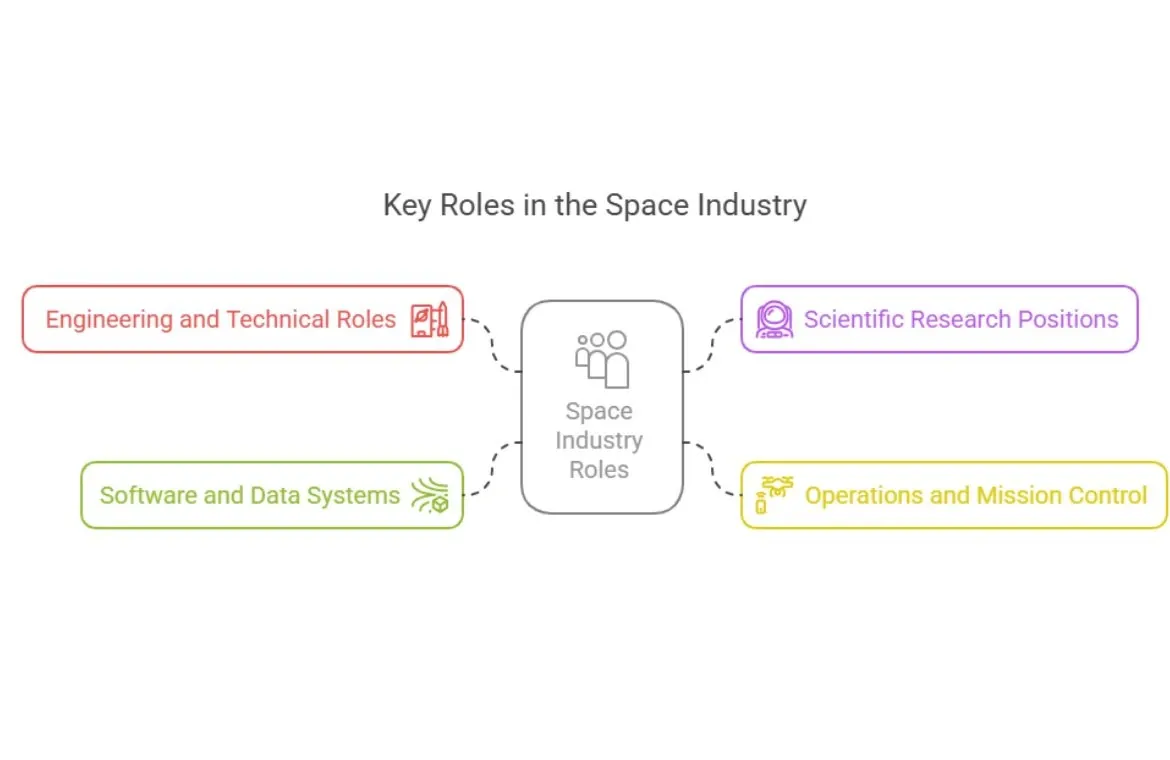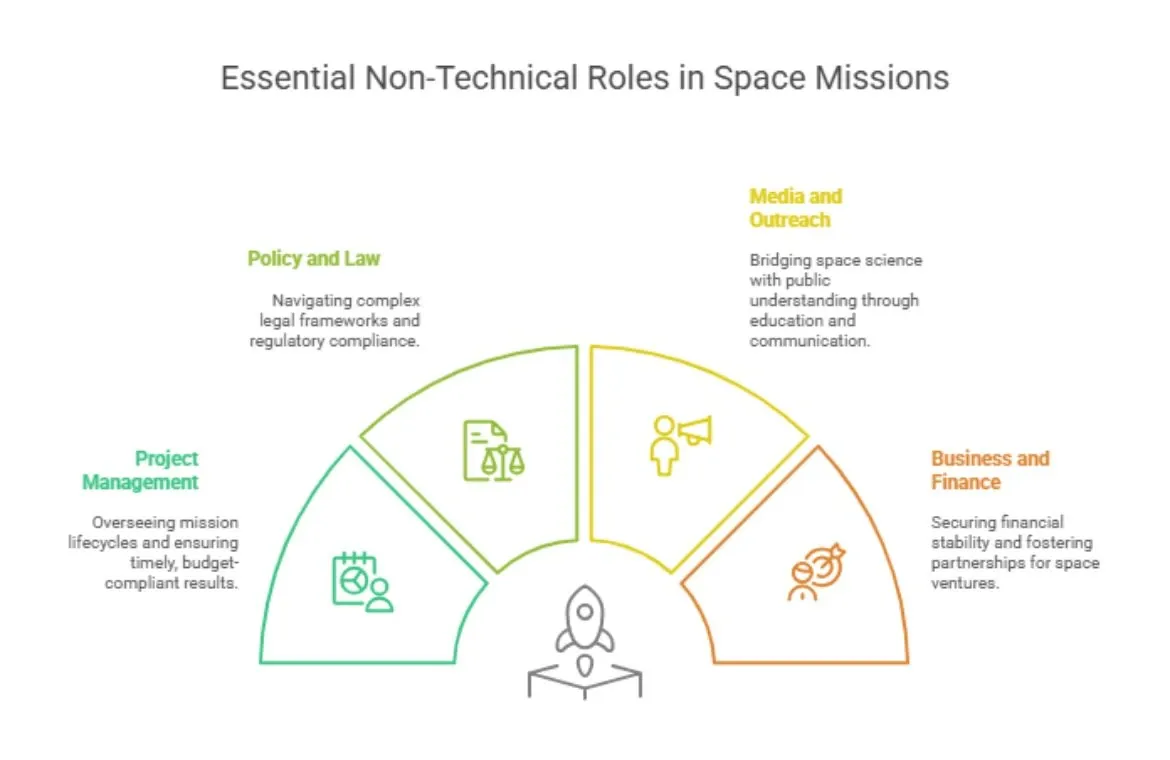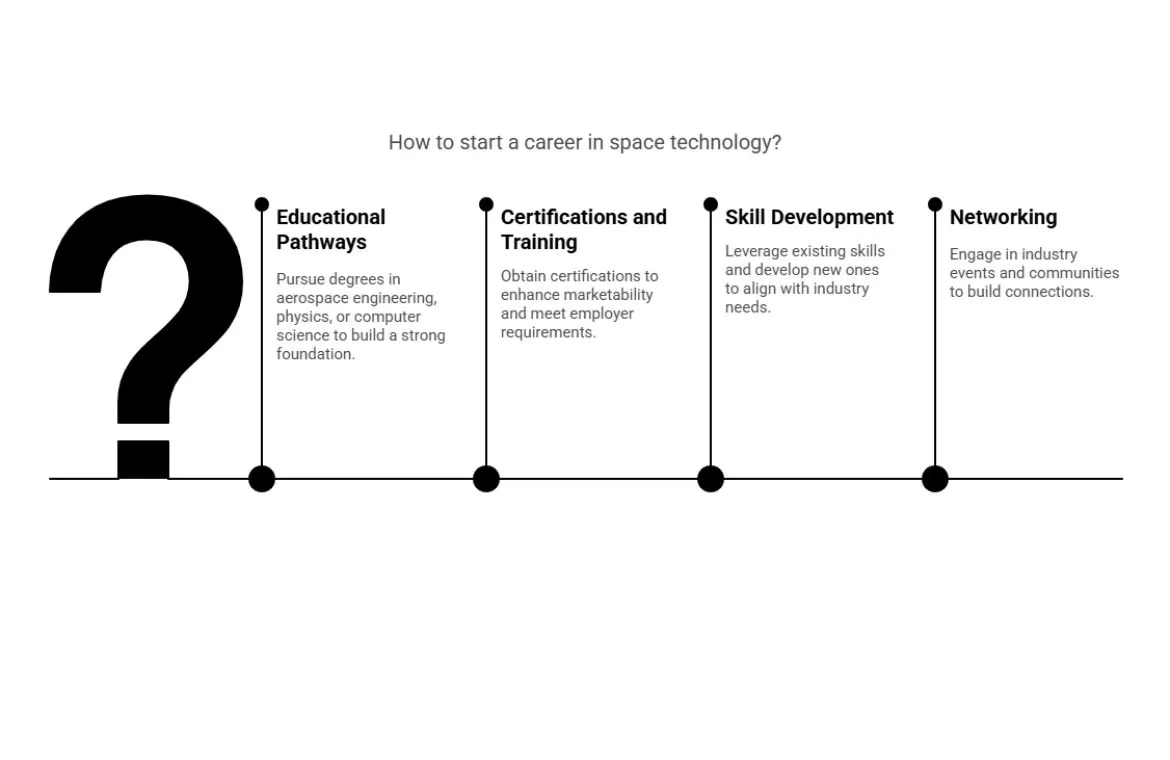Careers in the Space Industry

In the space industry, you don’t just reach for the stars, you help humanity touch them.
Many people think space careers mean becoming an astronaut. The reality shows a different picture. The industry welcomes professionals from engineering, science, and various support roles. Technical expertise is in high demand. Let's take a closer look at the career paths in this expanding industry. We'll explore everything from technical roles that need specialized training to crucial support positions. You'll find out how your current skills could fit into this exciting field and learn the steps to start your space technology career.
What is Space Technology?
Space technology stands as the foundation of humanity's journey beyond Earth. It has flexible tools and systems designed to explore beyond Earth's atmosphere. Anyone looking to build a career in the space industry should understand this field. It creates the base for all space-related work.
Space technology means developing and using technologies for launch vehicles, spacecraft design, payloads, operations, and ground systems that receive and process data. The technology has everything from rockets and satellites to space stations and deep-space communication systems.
How Does the Space Industry Work?
The space industry thrives on the dynamic relationship between government agencies and commercial enterprises. Each plays a unique yet complementary role that pushes space exploration and use forward. This knowledge proves crucial for anyone looking at space careers, as it helps you find where your skills can best serve humanity's space journey.
Public vs private sector roles
Government agencies traditionally led and funded space activities. Today, government space agencies act more as customers than operators. Public agencies can now focus on ambitious scientific missions and exploit private sector efficiency.
Commercial companies serve three leading roles in today's space industry:
- Contractors: They build components or complete systems that meet government specifications
- Service providers: They deliver launch, satellite, or data services to government and private customers
- Independent operators: They pursue their own commercial goals in space
What Are the Key Roles in the Space Industry?

The space industry runs on talent and expertise from many fields. Teams of specialists work together to turn ambitious missions into reality. Every successful launch and space exploration milestone happens because these experts overcome extraordinary challenges.
Engineering and technical roles
Engineers are the foundation of space missions. They design and develop the vehicles, systems, and equipment needed for space exploration. There are different types of engineers, with aerospace, general, and computer engineers leading the pack. These professionals design, test, and oversee the manufacture of aircraft, spacecraft, satellites, and missiles.
Engineers work on multiple projects. They build rockets to safely carry astronauts to the International Space Station, design satellites to monitor climate change, and develop the Starship programme for interplanetary travel.
Scientific research positions
Scientists are making breakthroughs in space exploration. Their work covers astronomy, astrophysics, cosmology, astrobiology, and astrochemistry. Most scientific positions require advanced degrees and field specialization.
India's commitment to advancing scientific research is evident in its expanding infrastructure and the growing number of opportunities for aspiring researchers. With continued investment and focus, the country is poised to make significant contributions to global scientific endeavors.
Operations and mission control
Operations specialists keep space missions running smoothly. They monitor spacecraft health, coordinate activities, and handle unexpected challenges. Mission control teams work day and night during active missions. Their split-second decisions can make the difference between success and failure.
Up-to-the-minute monitoring of spacecraft health is vital. Data science techniques help identify problems, predict failures, and ensure proper maintenance. These roles need people who pay close attention to detail and work well under pressure.
Software and data systems
Software engineers and data scientists now play key roles in the space industry. Data scientists handle and interpret huge amounts of information from space missions. Their work drives business decisions and answers complex questions about machine learning, astronomy, and aviation. At Starlink, software engineers write code that helps satellites direct themselves.
Beyond Technical Roles

Space missions need more than just engineers and scientists to succeed. Non-technical professionals play an equally vital role by creating operational frameworks, ensuring compliance, connecting with the public, and maintaining financial stability. These elements make ambitious space projects possible.
Project and programme management
Space project managers direct multidisciplinary teams throughout mission lifecycles to deliver results on time and within budget. Most managers start as senior scientists or engineers, and they need to understand both technical details and core project management methods like documentation, supplier relations, and quality assurance.
Their job covers staffing, budgeting, risk assessment, and stakeholder communication. They balance technical specifics with broader mission goals. One project manager puts it simply:
"If people lose perspective, everything falls apart".
Policy, law, and regulatory affairs
The space sector grows faster each day, creating a need for specialists who can direct activities through complex legal frameworks beyond Earth. Policy analysts and space lawyers tackle everything from lunar mining rights to satellite placement disputes. They write responses to international consultations, create space debris reduction plans, and speak for their organizations to regulatory bodies.
Media, outreach, and education
Space communicators and education outreach officers build bridges between complex space science and public understanding. They create educational programmes, lead museum tours, write articles, and talk to media outlets. Sometimes they become their organization's public face. Education officers run programmes at schools or museums. This role needs both scientific knowledge and teaching qualifications. Their efforts inspire future space professionals and help people appreciate space achievements more.
Business development and finance
Commercial space companies rely heavily on business experts who spot collaboration opportunities, build partnerships, and keep projects financially sound. These professionals create deals between organizations and private companies for services. Financial experts handle budgets, investments, and risk assessments for everything from space tourism to satellite networks.
How to Get Started with Space Technology?

“Space science is not just about the excitement of becoming astronomers, but it also involves complex and time-consuming science, an expertise that can only be built persistently over the years.” - as said by Dr. S. Somanath (Current Chairman of Indian Space Research Organization).
A career in space technology needs strategic prep work and staying power. The field offers growing opportunities, but you'll need the right mix of education, hands-on experience, and industry connections to succeed.
Educational pathways and degrees
Aerospace engineering, electrical engineering, physics, or computer science degrees are the foundations for many space careers. Most space professionals have advanced degrees, which shows how much specialized education matters. Master's programmes let you dive deep into satellite systems, remote sensing, and space mission design. PhD programmes focus on innovative research topics.
Certifications and training programmes
The right certifications can make you stand out in the job market. You should think about getting qualifications. The Space Skills Alliance helps you find the skills employers want.
Building relevant skills from other industries
Your current skills work well in space roles. Companies value programming, systems engineering, data analysis, project management, and critical thinking. Many graduates leave university with some, but not all, of the job requirements. Companies look at both technical skills and soft skills like accountability, attention to detail, and teamwork.
Networking and professional communities
The space industry's small size makes networking crucial. You should attend industry conferences, join professional groups, and be active on social media and job search platforms. Starting a space career takes time and grit. Research different parts of the industry first to see where your skills align with what employers want. This will set you up for an exciting and rewarding career experience.
Conclusion
The space industry is one of the most exciting and fastest-growing career frontiers of the 21st century. This article explored how space technology reaches way beyond the reach and influence of rockets and astronauts. It impacts our daily lives through communications, navigation, weather forecasting, and countless consumer products.
The evolving partnership between government agencies and private companies brings state-of-the-art solutions that create jobs across different fields.
Space careers no longer require astronaut training or technical backgrounds. Your existing skills in engineering, project management, business development, or communication could fit perfectly in this growing sector. The industry needs professionals who blend technical expertise with creativity, problem-solving abilities, and a collaborative approach.
Many paths can lead to a space career. You can choose the Advanced Certification Programme in Space Technologies, which can help you get relevant certifications to transfer your skills from related industries. Professional networking can help you find opportunities in this specialized field.
Space technology will play a vital role in tackling global challenges and stimulating economic growth in the coming decades. While your experience in this field might have its challenges, the rewards of contributing to humanity's greatest exploration efforts while building a meaningful career make it worth it.
Frequently Asked Questions
Q1. What kind of jobs are there in the space industry?
The space industry offers roles in aerospace engineering, satellite technology, data analysis, robotics, software development, astronomy, space law, project management, and mission planning across public and private organizations.
Q2. What is the highest-paying job in the space industry?
Aerospace engineers, astronauts, and satellite systems architects often earn the highest salaries, especially those in senior roles at organizations like ISRO, NASA, or private firms like SpaceX and Blue Origin.
Q3. What career should I pursue if I like space?
If you're passionate about space, consider careers in astrophysics, aerospace engineering, planetary science, space robotics, or satellite communications, fields that blend curiosity, science, and exploration with real-world impact.
Q4. How do you get a career in the space industry?
Start with a relevant degree in science, engineering, or technology. Build hands-on skills, join internships or research projects, and consider certifications or space-related programs from reputed institutions like ISRO.

TalentSprint
TalentSprint is a leading deep-tech education company. It partners with esteemed academic institutions and global corporations to offer advanced learning programs in deep-tech, management, and emerging technologies. Known for its high-impact programs co-created with think tanks and experts, TalentSprint blends academic expertise with practical industry experience.



